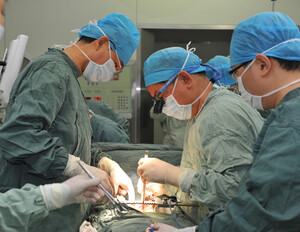- Adult Heart DiseaseDiseases of the arteries, valves, and aorta, as well as cardiac rhythm disturbances
- Pediatric and Congenital Heart DiseaseHeart abnormalities that are present at birth in children, as well as in adults
- Lung, Esophageal, and Other Chest DiseasesDiseases of the lung, esophagus, and chest wall
- ProceduresCommon surgical procedures of the heart, lungs, and esophagus
- Before, During, and After SurgeryHow to prepare for and recover from your surgery
August 7, 2017

As scary as it may sound, no surgical procedure is completely risk-free. That’s why it’s important for you and your family to know and understand that problems may occur after surgery. This way, you can decide if the potential benefits from the operation outweigh the possible risks. Usually this decision is easy.
For example, a lung cancer operation that offers a high likelihood of cure is worth the very small risk of having a major complication during or after that procedure. Similarly, though open heart surgery can be worrisome, the excellent chance of living a longer and healthier life outweighs the risk of serious complications, which occur 2%-5% of the time.
A surgical complication is broadly defined as any problematic issue that occurs during or after an operation. Though surgeons and hospitals are constantly focused on patient safety, sometimes complications cannot be prevented.
Complications can range from minor and easily treated problems to extremely serious and even life-threatening postoperative dilemmas. Though rare, serious complications that can happen after heart and lung surgery include:
- Death
- Heart attack or heart failure
- Kidney failure
- Serious bleeding
- Major infections
Less serious complications are difficulty urinating, minor heart rhythm irregularities, or minor infections that can be easily treated with antibiotics. Complications after surgery have the potential to prolong your hospital stay, as well as extend the time required for a full recovery.

When you are facing the possibility of surgery, your surgeon and perhaps other health care providers will explain your treatment options, including what might happen if you choose not to have an operation, the risks and benefits of the proposed surgical procedure, and his/her recommendations. This process is known as “informed consent.”
Informed consent suggests a partnership with your surgeon that indicates you understand your options, and that you have chosen them with the understanding that things may not always go as planned. Don’t hesitate to ask questions or request explanations so that you can be comfortable with your decisions.
I like to tell patients that though I hope for and usually expect an excellent result, complications can occur. When they do, it’s important that the patient and their families can look back and say that they understood a complication was possible and that they still feel like they made the right choices.

It is impossible for your surgeon to describe every possible complication during a preoperative visit. Furthermore, research has shown that many patients don’t remember or don’t understand a lot of the details discussed during a preoperative visit with a surgeon. This is because they are understandably nervous and not familiar with the technical aspects of surgery. That’s why we have educational websites like www.ctsurgerypatients.org, as well as nurse practitioners and physician assistants to explain things again or in different ways.
The great majority of surgical complications do not occur because your surgeon or surgical team made a mistake or did something wrong. Surgical complications may happen after operations that went smoothly and that were expertly performed. Your chance of experiencing a surgical complication usually depends on your condition going into the operating room. For instance, the risk of complications increases:
- With advanced age
- If the operation is an emergency
- If you have a chronic medical condition like diabetes, kidney failure, or lung disease
Extensive research and experience with millions of patients now allow heart surgeons to predict the risk of many types of complications after heart surgery. These predictions are the result of a very complex statistical analysis of The Society of Thoracic Surgeons (STS) National Database, which contains more than 7 million procedure records.
The STS Risk Calculator allows a user to input information about the patient, such as type of heart disease, age, heart function, and other medical conditions. Using data from the STS National Database, the calculator then estimates the risk of death or complications with your heart surgery. It is important to understand that the STS risk scores are the result of complex statistical calculations that are not necessarily exact for all patients. They do, however, offer a ballpark estimate of your surgical risk.
When a surgical complication occurs, it is natural to ask “Why me?” or “What happened?”. This is especially true if your problem wasn’t one of the common complications mentioned by your surgeon or his/her staff before your operation. Make sure to ask specific questions about your circumstances, including the next treatment steps and the potential for a full recovery.
It is important to know that your surgeon and his/her team are highly trained to treat most complications both in and out of the operating room. It may be that consultants, such as intensive care, kidney, or infectious disease specialists might be called to assist. Most surgical complications can be successfully treated, leading to an excellent outcome.
Read more about Before, During, and After Surgery.
The opinions expressed in this article are those of the author and do not necessarily reflect the views of The Society of Thoracic Surgeons.

